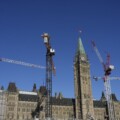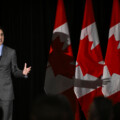The Montreal Economic Institute, a free market think tank based in Quebec, will celebrate its 25th anniversary this year with a new president and CEO taking charge.
Daniel Dufort, who currently serves as the organization’s vice president of operations, will take over from Michel Kelly-Gagnon, who will shift to the role of founding president.
Although cultural issues have dominated the debate in Quebec recently, it hasn’t reduced the relevance or need for a free market think tank, said Dufort, who will officially assume the new role on April 5.
“Luckily for us, Quebecers have also remained extremely engaged when it comes to discussing the state of our health-care system and they show increasing openness to the ideas that promote freedom of choice and free market solutions in that sector,” said Dufort.
The pandemic has shifted the tectonic plates beneath our health-care debates, as provinces experiment with private delivery of health-care services to battle backlogs in the system.
Dufort said that MEI conducts regular polling on Canadians’ attitudes toward entrepreneurship in our provincial health-care systems and they have found that people are becoming more open to the idea.
“You could say that they are finally catching up to Quebecers when it comes to that. So that is very good to see,” said Dufort.
“What we’re trying to do is to be at the vanguard of change and innovation in Quebec, and then to help export this to other Canadian provinces. And I think we are finding some success in this. And we want to build on that,” said Dufort.
Kelly-Gagnon said the increased openness of Quebecers towards more entrepreneurship in health care is one of the most satisfying achievements of his quarter century at MEI.
Both men credit this success with MEI’s insistence on taking policies to policymakers and trying to get them implemented, helping with some of the heavy lifting of lawmaking.
“In the past 24 months, for instance, our presence and impact in Alberta has grown significantly. I think this flows from our willingness to engage with policymakers via our civic engagement program,” said Kelly-Gagnon.
“The fact we offer our advice free of charge to political parties of all stripes helps us popularize our research and make sure it reaches the appropriate decision-makers,” he said.

Dufort who previously worked in Stephen Harper’s prime minister’s office as a speechwriter, issues manager, and stakeholder relations adviser said his experience in Ottawa taught him how to help a policy paper turn into legislation.
“One of the things at MEI that we put focus on is to be able to lay a blueprint for how that change can actually be implemented by decision-makers. And my background certainly is very helpful in that regard,” said Dufort.
While this initiative provides policymakers with ideas and solutions, it also pushes the think tank to offer policies that are politically viable.
Kelly-Gagnon said he’s hopeful about the future of MEI as he departs his role. The think tank has always argued for free market ideas, entrepreneurship, and free speech and that spirit runs through the organization.
“Our willingness—as an organization—to constantly experiment with new ways of doing things (gives me hope). Fundamentally, we are an entrepreneurial organization,” said Kelly-Gagnon.
Recommended for You

The Notebook by Theo Argitis: Carney’s One Big Beautiful Tax Cut, and fresh budget lessons from the U.K.

Rudyard Griffiths and Sean Speer: The fiscal hangover from the One Big Beautiful Bill hits Canada

Lucy Hargreaves: Canada needs builders, not bystanders

Ginny Roth: How vacant liberal nationalism left Canada worse off than George Grant even imagined



